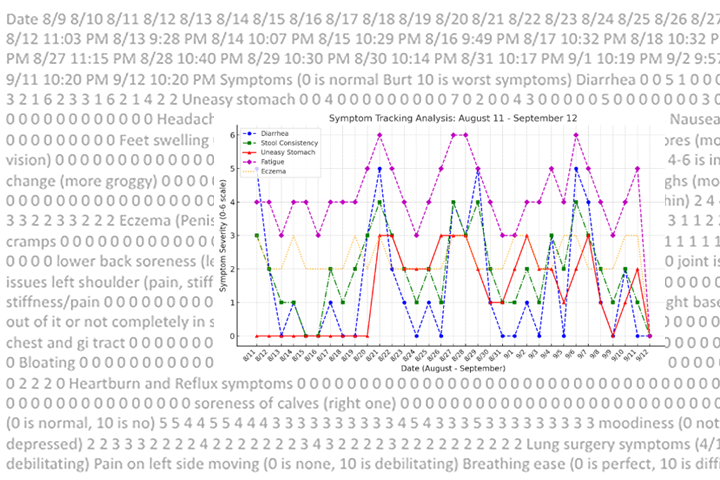Why Side Effect Management Matters More Than Ever

The fight against cancer has never been more innovative, with treatments tailored to attack tumors more precisely than ever.
Yet, with progress comes complexity, and today’s cancer therapies can affect more than just cancer itself. The side effects of immunotherapy and other targeted treatments can expand far beyond the hair loss, nausea, and neuropathy associated with traditional treatments like chemotherapy and radiation.
From the top of your head down to your toenails, and everything in between, so many parts of your body can be affected: your nervous system, endocrine system, eyes, heart, kidneys, muscles, joints, skin, and other organs. Once damaged, some organ functions might never come back, especially the delicate, hormone-producing glands like the thyroid or pituitary, leading to chronic conditions.
In fact, it is estimated that more than 65 percent of those getting immune-based treatment get organ-specific toxicities or other immune-related adverse effects. Some of these effects persist long after the cancer treatment ends, or present years later.
It’s why doctors like Afreen Shariff, M.D., M.B.B.S., director of the Duke Endo-Oncology Program, are calling for a more comprehensive approach to cancer patient care.
“There is a global unmet need for targeted side effect management. Care for comorbidities, side effects, and complex toxicities should be a part of your cancer treatment from the time of diagnosis and treatment initiation. Not an afterthought. And it should extend beyond treatment to address long-standing comorbidities and side effects that can have a lasting impact on your quality of life,” she says.
“Once upon a time but not very long ago, simply surviving cancer was considered a treatment success. If you’re six feet above the ground, in a wheelchair, struggling but cancer free, that might not be the way you want to live your life after beating cancer. We should be expanding our expectations and considering ‘thrivership’ rather than survivorship,” she adds.
“This is a new and welcome era in cancer care but are we prepared to take on the rapidly growing challenge? Today, we are better at treating cancer, but what about the consequences affecting patients as long as they survive? What about comorbidities, what about side effects?”
Change in Scope
Oncologists, palliative care practitioners, and general practitioners have become skilled in managing the side effects we have come to expect from chemotherapy and radiation treatments, but when immune-stimulating treatments begin causing side effects like Type 1 diabetes, skin rashes, adrenal insufficiency, heart conditions, and rheumatoid arthritis, the need for co-management and “passing the baton” to other specialists is a time sensitive and life-saving measure for patients.
As Shariff explains, a healthy immune system requires consistent fine-tuning, like having one foot on the brake, the other on the gas, trying to keep yourself going at a steady 40 mph, give or take 10 mph.
“When you’re undergoing immunotherapy or therapies that accelerate your immune system, your body is going 100 mph in a 40 mph zone. You are going to have more accidents,” she notes.
Some of the things that can go wrong include:
Autoimmune Conditions: Immunotherapy therapies can aggravate a preexisting autoimmune disease or cause new ones, such as colitis, pneumonitis, myocarditis, rheumatoid arthritis, psoriasis, dermatitis, myasthenia gravis, nephritis, and others. Preexisting conditions like neuropathy, heart failure, renal failure, liver problems, bowel issues like Crohn’s disease, can also be exacerbated.
Diabetes and Endocrine Issues: Both cancer and cancer treatments are associated with a wide variety of endocrine diseases, including pituitary dysfunction, new onset Type 1 diabetes, and drug-induced thyroid abnormalities, seen commonly in those treated with immunotherapy. When given in combination with chemotherapy, side effects can be compounded and more aggressive.
In addition, other medications taken alongside cancer therapy, such as steroids, can cause lasting side effects, including weight gain, bone loss, bruising easily, and diabetes. In the context of those with pancreatic cancer when individuals lack the ability to produce enough insulin, immunotherapy paired with chemotherapy regimens that often also include steroids (dexamethasone, prednisone, and others) can have a profound impact on blood sugars.
Getting the Help You Need
The extent and range of these side effects requires specialist expertise, beyond primary care, oncology, and palliative care. As a consequence, specialist fields such as oncoendocrinology (also known as endo-oncology), cardio-oncology, oncodermatology, oncorheumatology, onconephrology, and even exercise oncology have emerged to cater to cancer patients.
But the likelihood of finding these specialists in community treatment centers—where an estimated 85 percent of the 5,500 cancer cases diagnosed each day are treated—is low. For instance, in a recent report by GoodRx, 70 percent of counties in the United States are entirely without an endocrinologist; and those counties reported a 12 percent higher mortality due to diabetes complications.
A pancreatic cancer patient in this situation could end up with extra hospitalizations, a poorer quality of life, treatment termination, or even death. Dr. Shariff finds this unacceptable.
“We should be doing better. We need a scalable solution for cancer patients: eliminate long wait times, get appointments to endocrinologists and other specialists at the fingertips of patients and oncologists.“ she says.
She established Citrus Oncology with Aabid Shariff, Ph.D, and national leaders in the field of side effect care and survivorship, to increase access to specialists and reduce the wait to see them. The care is delivered virtually to eliminate access barriers and encourage faster treatment, more compliance, fewer complications and hospitalizations, and better overall outcomes. In fact, fast recommendations to treat cancer-related side effects have already been shown to be effective in lowering hospitalizations by greater than 70 percent, according to a study performed by Afreen Shariff at Duke University.
“I don’t think the place a person lives or gets cancer treatment should dictate the care they receive for side effects,” she said. “We need to democratize access. And we need to do it NOW before we lose more lives to poorly managed side effects.”
Citrus Oncology is a virtual multispecialty cancer support clinic designed to match patients with specialists within two business days, a big improvement on the current average wait of three to six months. Shariff emphasizes that “time is critical. Time is lives in the cancer world. A person’s treatment depends on the management of side effects, and their quality of life is impacted. Hospitalization due to acute symptoms that develop can lead to treatment interruptions and cancer progression.”
Medical experts in several areas—such as endocrinology, cardiology, nephrology, dermatology, and rheumatology—are available to address a range of side effects, from fatigue to more debilitating conditions unique to immunotherapy. They can be involved at any stage of the cancer journey, from helping to manage preexisting comorbidities before starting cancer treatment to prevent them getting worse to responding to emerging issues during treatment and long-standing side effects that may continue after treatment.
When a patient experiences a side effect that requires specialist input, an oncologist can submit a referral through their electronic health record or via fax, directly to Citrus Oncology, providing relevant patient information and specific concerns. Citrus Oncology experts will then provide them with recommendations that can be implemented locally.
Patients can also request a consultation directly through the Citrus Oncology website; these often cost no more than the average doctor’s visit, with the ability to bill insurance companies directly.
“We want to make it as easy and cost-efficient as possible for patients,” Shariff says. “Every patient deserves access to expert care for cancer treatment-related side effects, and we’re working hard to make that a reality.”






